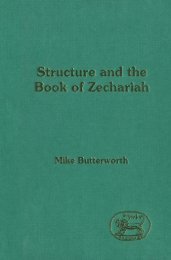Appendix CASE ONE - Collection Point® | The Total Digital Asset ...
Appendix CASE ONE - Collection Point® | The Total Digital Asset ...
Appendix CASE ONE - Collection Point® | The Total Digital Asset ...
You also want an ePaper? Increase the reach of your titles
YUMPU automatically turns print PDFs into web optimized ePapers that Google loves.
74 Legal History in the Making<br />
understood the difference between his limited task and the ambition of other<br />
jurists to describe the whole world of persons, things and human conduct from<br />
their legal perspective.<br />
Consistent with this approach, Finch's treatment of 'persons' in both<br />
versions was very short. Cowell's Institutiones, by contrast, dwelt quite a bit on<br />
the Year Book learning about villein status, bastardy, marriage and wardship,<br />
all under the general rubric of 'persons'. <strong>The</strong> principal distinctions, according<br />
to Justinian and Cowell, were between the free and the unfree, between<br />
independent and dependent persons. Finch treated the few remaining rights<br />
of lords over their villeins and wards under the category of 'hereditaments'<br />
within his treatment of possessions. He kept a law of persons as the first<br />
category, but for him the two chief distinctions among persons in English<br />
law were first the division between the king and his subjects, and second<br />
that between natural persons and bodies politic or corporations. Neither<br />
distinction figured in Justinian's Institutes. 65<br />
Of Finch's two ways of classifying persons, the first - sovereign and subject<br />
- was clearly central to his conception of the shape of English law. In nearly<br />
every part of his Nomotexnia and Law, Finch distinguished the special rules<br />
that applied to the king, 'prerogative', from the statutes and case law that<br />
pertained to everyone else. This division substituted, in a way, for a publicprivate<br />
distinction, which is almost wholly absent in Finch's scheme. On the<br />
continent jurists had been criticizing the Institutes' treatment of persons for<br />
its failure to emphasize the differences between men and women, clergy and<br />
laity, Christians and non-Christians and noblemen and commoners. 66 Finch<br />
took a very different approach, in which all such differences in the conditions<br />
of persons diminished in significance when compared to the vast gulf between<br />
the sovereign and the subject. Finch left the impression that, given the sheer<br />
number of exceptions and special rules devised for the king's prerogative,<br />
everyone else was, comparatively speaking, equal before the law. 67<br />
In treating possessions Finch kept the major distinctions drawn by Littleton.<br />
Contracts did not stand out as the major category they had been in Cowell's<br />
Institutiones, but were made subsidiary to the types of personal chattels. He<br />
defined a contract restrictively, as 'a mutual agreement for the very property of<br />
65 In classical Roman law, a 'person' was a human being. Beginning in the twelfth century, canonists<br />
and civilians treated corporations first as fictive persons and finally as a special type of legal 'person'.<br />
See, e.g., P.W. Duff, Personality in Roman Private Law (Cambridge, 1938), 48-50; J. Canning,<br />
<strong>The</strong> Political Thought of Baldus de Ubaldis (Cambridge, 1987), 186; J.P. Canning, '<strong>The</strong> Corporation<br />
in the Political Thought of the Italian Jurists of the Thirteenth and Fourteenth Centuries', Hist. Pol.<br />
Thought, i (1980), 15.<br />
66 Jolowicz, Roman Foundations of Modern Law, 69; Kelley, 'Gaius Noster', 628, 632 (Alberigo,<br />
Eguinaire Baron).<br />
67 Finch's earlier religious writing similarly rejected Old Testament laws based on personal distinction<br />
between free and slave, citizen and alien, clergy and laity, etc., such 'respect of persons being<br />
extinguished with us'. H. Finch, 'A Conference or Reformation', quoted in Prest, '<strong>The</strong> Art of Law',<br />
99.






